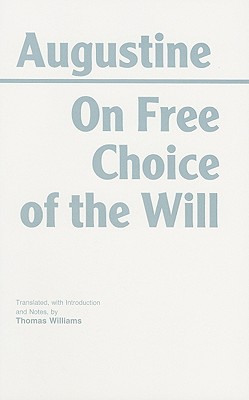 "On Free Choice of the Will" (Google Preview) was one of Augustine's earlier writings, and long before the Pelagian Heresy reared its ugly head. I picked this 120 page treatise up after reading Luther's Bondage of the Will to go to his sources: ad fontes! Aurelius Augustine of Hippo (354-430) wrote De Libero Arbitrio (it's Latin title) in three parts, the first in circa 387 A.D., and the last two in 395 A.D. The book is formated like the Greek Dialogues of Plato where "Augustine" instructs "Evodius." The first question begins, as well as ends my translation of the book (by Thomas Williams): "Evodius: Please tell me: isn't God the cause of evil?"
"On Free Choice of the Will" (Google Preview) was one of Augustine's earlier writings, and long before the Pelagian Heresy reared its ugly head. I picked this 120 page treatise up after reading Luther's Bondage of the Will to go to his sources: ad fontes! Aurelius Augustine of Hippo (354-430) wrote De Libero Arbitrio (it's Latin title) in three parts, the first in circa 387 A.D., and the last two in 395 A.D. The book is formated like the Greek Dialogues of Plato where "Augustine" instructs "Evodius." The first question begins, as well as ends my translation of the book (by Thomas Williams): "Evodius: Please tell me: isn't God the cause of evil?"
The Thomas Williams translation contains a lengthy introduction, and ends with selections from Augustine's Retractions that contains Augustine's reconsiderations of De Libero Arbitrio. And reflecting back on the book, without reading the notes from Retractions, it would be possible for many people to misconstrue Augustine as to be even advocating a Pelagian view. Augustine says that Pelagius used this book and similar writings against him later. In the Retractions, several selections that Augustine wrote quickly and briefly in De Libero Arbitrio were repeated and reaffirmed, and Augustine even praised himself for anticipating the Pelagian Heresy's arguments.
The most important clarification in the appendix, is that Augustine said that he wrote De Libero Arbitrio against the Manichaeism, who held opposite beliefs than the Pelagians. Mani, a Persian philosopher, and someone Augustine "confesses" to have been a hear of for 9years before he was a Christian. Mani taught a form of Dualism that attributed evil to the god of the Old Testament and attributed good to Jesus (or rather the god of the New Testament), and in that sense, Mani wished to attribute evil to God. Throughout De Libero Arbitrio, Augustine affirms the "free choice of the will", meaning that individuals have a free choice in their actions and do not only (as Evodius argues) "do things out of necessity". As the retractions affirm, there are times that when evil and sin is done out of necessity, man is still guilty for it, but Augustine's primary argument is to show that God is not evil and does not do evil. There's a very good argument at the beginning that consists of reasoning that teaching only occurs when knowledge of Good is transfered, so knowledge of evil is not truly teaching.
Augustine is an amazing orator and writer, and his other works are so beautifully written that even simple folk may understand and benefit from them, however, Augustine is no fool. And, this work is very difficult to read and follow, and is a flex of Augustine's muscles. Some wrongly argue that his Retractions prove that it is only the later Augustine that matters, and however true that may be, the book as the editor WIlliams said is not really a "retractions" but rather a "reconsiderations" where Augustine doesn't "retract" as so much as rather he "clarifies" what he originally said.
One additional feature to note, is that it is no accident that this book is written as a Greek Dialogue because there are long passages where Augustine explains the Will by appealing to Platonic Forms and a Platonic understanding of Mathematics. He explains forms by using mathematical concepts of the "number one" and tackles some of his interesting answers about how forms are somehow part of God.
It's hard to understand this work without also reading Augustine's "Anti-Pelagian Writings" and maybe his "Anti-Manichaean Writings" as well.



Leave a comment